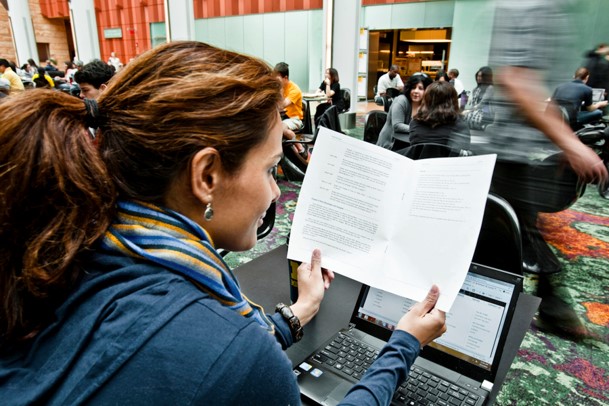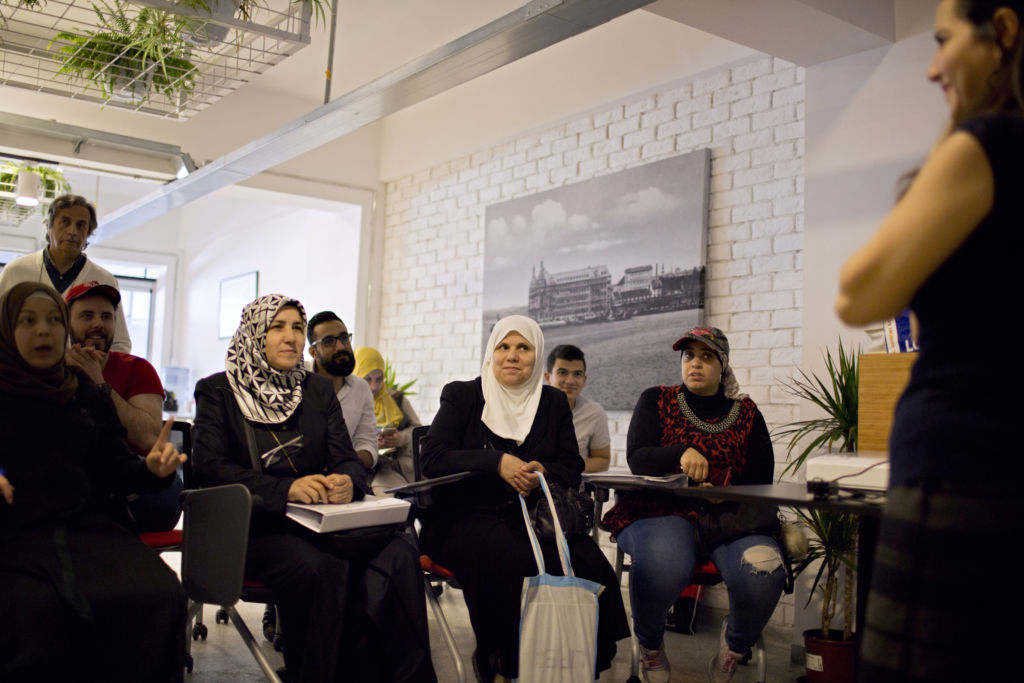
WDI Publishing is organizing a new competition for case studies focusing on the unique advantages and challenges of doing business in the Middle East and North Africa (MENA) region.
Submissions for the competition, “Doing Business in the Middle East, North Africa Region,” should focus on a business dilemma of an organization or company located or doing business in the MENA region. The cases may feature a small or large organization, private sector multinational, non-governmental organization (NGO) or nonprofit.
The global competition is open to individual students or student teams, as long as they enter in collaboration with a faculty member from a degree-granting university or college. Faculty or faculty teams may also enter as long as they are currently teaching at a degree-granting university or college. Other individuals may also enter, provided they do so in collaboration with a faculty member from a degree-granting university or college.
The winning entry will be awarded $5,000. Second place will earn $3,500 and third place $1,500. Additionally, all three winning cases will be published by WDI Publishing and added to its case catalogue. Entry forms are due Dec. 12, 2019, and the final case and teaching note must be turned in by Feb. 9, 2020. Winners will be announced on March 20, 2020.

To learn more about key deadlines, entry requirements, judging criteria and to access entry forms and submission documents, click here. For resources on how to write a case study and a teaching note, along with other helpful information, click here.
WDI Publishing has assembled an impressive panel of judges for the competition. They are:
Kim Bettcher – Center for International Private Enterprise (CIPE)
Andrew J. Hoffman – University of Michigan Ross School of Business
Manel Khadraoui – University of Tunis/Tunis Business School
Hagop Panossian – American University of Beirut Olayan School of Business
WDI Publishing Manager Sandy Draheim said she hopes the competition will encourage the development of new, academic case studies about the MENA region, increase the understanding of doing business there and grow the critical thinking skills of university students in these countries through the use of these new MENA-focused cases.
“There are many regions of the world that could use more ‘localized’ business case studies for higher education,” Draheim said. “But, partly based on the incredible response, interest and results of WDI’s M²GATE program, we thought it would be interesting to target our first geographically-themed case competition around MENA issues. We want to elevate the quality and quantity of teaching materials that provide students – both in the MENA region and around the world – with opportunities to take on the roles and responsibilities of managers in organizations located or doing business in this region.”

Note: The following post was originally published on NextBillion.net, which is managed by WDI.
By Amy Gillett and Kristin Babbie Kelter
There are currently 25.9 million refugees worldwide, as the world experiences the highest levels of displacement on record. These refugees fled their countries due to war, natural disaster or persecution, and were often forced to leave behind their possessions, as well as their livelihoods. So they are, in many ways, forced to start over upon arrival in their new country.
This process begins with finding a new livelihood. However, refugees may have trouble landing a job due to discrimination, legal barriers, language limitations and lack of social networks. Given these hurdles, it is not surprising that some refugees turn to entrepreneurship out of necessity. Starting a business – especially if their customers are primarily fellow refugees – can allow them to sidestep the obstacles of discrimination and language. It is also attractive in that it enables independence, allowing the entrepreneur to “be their own boss.”
But starting a business is a challenge for anybody, and business failure rates are high. How do refugees — faced with the additional challenges of being new to a country and often not speaking the language — manage to establish successful enterprises? It turns out that along with their unique challenges, they also bring some unique assets to the table. These attributes can both position them for success and enable them to enrich their host nation.
Resilience is an attribute that is often associated with successful refugee entrepreneurs. Experiencing crisis in their home countries, coupled with the difficulties of relocation, help shape a mindset conducive to entrepreneurship. Successful refugee entrepreneurs are driven and have a “one-way ahead” attitude. This attitude is not just about succeeding: It’s about surviving and having a decent, meaningful life after having lost so much. “They really just want to get moving towards a better life in which they are able to work to benefit themselves, but also their families and their communities,” says Mari Kira, a lecturer and research scientist at the University of Michigan whose work explores career and identity growth among refugees.
Rima Bizri, a professor at Rafik Hariri University in Lebanon, wrote a case study of Mostafa, a Syrian refugee who was forced to shut down his restaurant back home, and started a new restaurant in Lebanon. According to Mostafa: “Success meant a lot to me, but survival meant even more … To me, failure meant starvation and homelessness … Failure was unthinkable.” Mostafa was supported by his wife, who shared his vision and drive. “All we could talk about is the restaurant … our lives were centered on the restaurant … it was our passion,” she said.
Indeed, refugee entrepreneurs are rarely alone in their entrepreneurial journey. They’re able to enlist the support of their family members, and fellow countrymen and countrywomen, by creating a shared vision and showing how the business will benefit all of them. This social network can be a vital source of labor and moral support. By tapping this network for employees, refugee entrepreneurs find workers who speak their language, have similar cultural values, feel an obligation to one another and have compassion for them. Even those who aren’t blood relatives come to be treated as members of the family, creating a “pseudo-family business.” Such a strong unit has an inherent advantage in finding entrepreneurial success: Notably, nearly one-quarter of small businesses fail because they haven’t assembled the right team.
Furthermore, refugees tend to be good at bootstrapping their businesses. They start out with their personal savings, and sometimes supplement that with contributions from friends and family. Money earned from customers is plowed back into the business. Since outside capital is generally not an option, they become adept at reducing their operating costs to a minimum and drawing on their social networks for support when needed.
Take the case of Shaker Moutraji, a member of the U.S.-government funded Livelihoods Innovation through Food Entrepreneurship (LIFE) Project. He owned seven sweet shops in Syria — specializing in cheese Mamul — before he closed them the week the civil war began. After leaving Syria, Moutraji did not have any capital to open a cheese Mamul production business in his new home in Mersin, Turkey. To overcome this barrier and launch a business, he bootstrapped by borrowing 600 Turkish Lira (about US $100) to purchase a used refrigerator and ingredients to get started.
While some refugee entrepreneurs may remain small and limited to serving the market of fellow refugees, others will move beyond this “enclave economy.” When refugee entrepreneurs offer goods and services that are competitively priced and in demand, host community members will become customers. They will benefit from these valuable new products and services, and the entrepreneurs will enjoy access to a much larger market.
For example, Fatma Ahmed, who fled from the armed conflict in Yemen, is working to reopen the pastry shop she had owned back home – but this time in Istanbul. Ahmed, also a member of the LIFE Project, understands the importance of tapping into the Turkish market to expand her customer base. She is learning as much as she can about Turkish culture, which is crucial for marketing her business to Turkish customers.
But even with a high drive to succeed and a solid business model, refugee entrepreneurs can still be stymied by obstacles. To help these entrepreneurs succeed, institutions within host countries can offer various types of support. Governments should help them register and operate their businesses as legal entities, as well as facilitate their access to international markets, such as through participation in trade expos. Governments should also seek to provide human and social services, such as education for youth, language classes, and access to social workers, health care, and basic needs like housing and food.
NGOs, support organizations like accelerators and incubators, and local universities can also help refugee entrepreneurs. They can assist by providing counsel on legal and export matters, providing office space and equipment during the initial startup phase, and offering training on relevant topics such as business models, marketing, customer service, finance and accounting, and human resource management.
When entrepreneurship support programs are created, they should, when possible, be open to both refugees and the host community. An influx of refugees in a community can lead to a strain on local resources like housing, schools, and jobs, especially in areas that were already experiencing economic instability. The competition over resources – in combination with varying social norms and the temporary status of refugees – can make it difficult for refugees and host communities to come together as one community. Entrepreneurship programs that engage refugees can seek to build social cohesion by opening the program to a diverse audience and facilitating positive interactions. A successful example of this is the International Labour Organization’s Ready for Business program, piloted recently in Indonesia. The program provides entrepreneurship training to refugees from Afghanistan, Somalia, Eritrea, Ethiopia, Yemen, Iraq, Myanmar and Sudan – as well as local youth in the Jakarta neighborhoods where refugee shelters are located. The LIFE Project takes a similar approach to building sustainable livelihoods through entrepreneurship: its food incubator model and suite of business support services in Turkey engage refugees from countries such as Syria, Yemen, Palestine and Iraq, as well as local Turks. The project also has a gastrodiplomacy component to facilitate meaningful connections across cultures, using food as a vehicle.
While every refugee entrepreneur has a unique story, those who are successful can challenge the negative perceptions and images of refugees that often arise during humanitarian crises. This can help their host communities shift from viewing refugees as a financial and social burden, to seeing them as a source of vitality, spurring economic growth and job creation and introducing new products to the market. Successful refugee entrepreneurs bring focus, drive and commitment to their ventures, modeling the mindset any entrepreneur needs to grow a business.
Amy Gillett is the vice president of education at WDI. Kristin Babbie Kelterborn is a senior project manager at WDI. They lead WDI’s Entrepreneurship Development Center.
The authors would like to thank Rimi Bizri, Mari Kira, Eric Fretz and Ozge Savas for their contributions.
Photo courtesy of the Life Project.